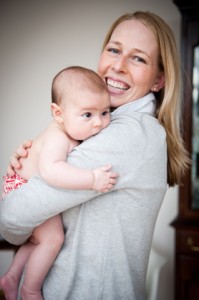
Ania gave birth in Austria and shares what she learnt from the experience
Having your first baby can be nerve-wracking. Having your first baby in a foreign country where you don’t speak the language can be absolutely petrifying. At least, at first. In my case, when I found myself pregnant in Vienna, Austria, having my first baby there proved to be just about the best experience I could have asked for. Here’s what I took away from the experience.
When looking for doctors, recommendations are your best friend
While this is true just about anywhere, in a foreign place, you don’t want to sign yourself up to be a guinea pig if you can avoid it. If you ask around, you’ll find that there are already doctors who speak your native language, and who are used to working with your nationality on a cultural level. For example, my Austrian doctor knew that as an American, I’d probably have a lot more questions than her average patient.
People will laugh at your birth plan
In the US, just about every website and book recommends that you print out and carry around a full birth plan with answers to pertinent questions about delivery, medications, pacifier policies and the like. I highly suggest reading and filling out this document, discussing it with your partner, and leaving it at that. Nearly everyone else will think you have totally lost your mind. Other people just don’t go into that kind of detail – they either trust the doctor or defer to the cultural norm. However, having one is still a useful exercise in what you think your ideal plan will be – it’s worth spending time thinking through the various aspects that are involved. Just don’t overthink it, and don’t expect the hospital staff abroad to treat it as a governing document. Chances are, they have never seen one before. If you want to make a point of something, do so on the things that really matter most to you.
Check a little… but not too much
When you’re having your first child, staying informed is a good thing. With language barriers, you have to be tuned into when things are going right (or wrong). So, keep tabs on your progress with a couple of notebooks, check in with a few websites, but don’t constantly monitor every message board. You’ll only scare yourself – know when to say when.
Be open to local adaptations
Most women I know are shocked when I tell them that I had an ultrasound at every visit, or that I stayed in the hospital for 8 days after my C-section. I thought it was surprising too – but I learned to embrace these differences and now I can’t imagine what it will be like to have another child without them. The collection of ultrasound photos gave us a storybook of our child’s development that we treasure, and the week in the hospital was full of caring nurses, delicious schnitzels, a nursing support system, and seven blissful nights of sleep. If you’re open to other ways of doing things, you might find that some things can be even better.
Speak up for yourself
In many countries, including Austria, there is much less patient-doctor “dialogue”, even though you’ll find that you actually have more time with the doctor overall. From an American perspective, you are likely used to making medical decisions “together”, while in other places the decision is made for you. You will have to trust your doctor on some of these (which is why the first point is so important), but if you feel like you don’t know what’s going on, or that something is being decided without you, speak up. You have to be your own advocate in the process, and it is still your right to know what’s happening.
How about others? What have you found to be a helpful lesson learned from having a child abroad?
_____________________________________________________________________
Ania went to school to become a diplomat but married one instead. Together with their daughter, she and her husband live the world in two to three year increments, most recently returning from Vienna, Austria. She works as a senior director in the field of human resources consulting, and currently resides in Washington, DC, awaiting the next assignment. Ania enjoys writing for her blog, The New Diplomat’s Wife, photography and travel with her family. Twitter: @thenewdiplomats